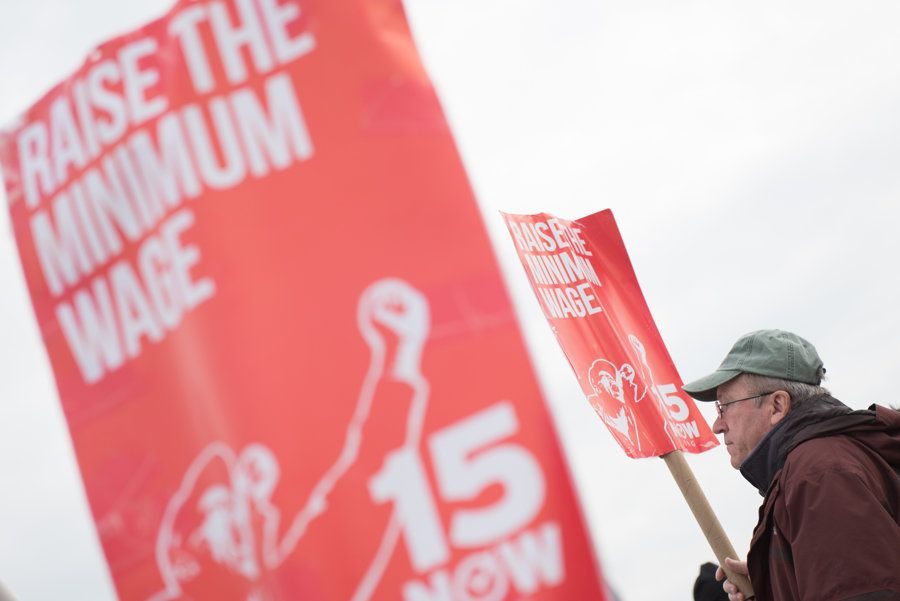New Jersey Will Raise Minimum Wage to $15 an Hour
February 28, 2019
On Monday, February 4th, Governor Phil Murphy signed into a law a long-awaited hike in New Jersey’s minimum wage. The law will raise the hourly minimum wage for most New Jersey workers from $8.85 an hour to $15 an hour by increments, eventually reaching $15 by 2024 for most workers. After 2024, the minimum wage will be tied to the Consumer Price Index (CPI-W), increasing as inflation occurs. Farm workers will have their hourly minimum wage raised to $12.50 by 2024, with further increases pending.
With the passage of Bill A15/S15, New Jersey joins three other states—California, Massachusetts, and New York—and the District of Columbia in raising its minimum wage to $15 an hour. New Jersey Governor Phil Murphy heralded the passage of the bill as a way of making New Jersey’s economy “both fairer and stronger.” Murphy made the passage of a $15 minimum wage a signature campaign promise in his run for governor and had hoped to pass a bill to do so in the first year of his governorship. Attempts to pass minimum wage legislation occurred under the administration of former Governor Chris Christie as well; however, Christie, a Republican, vetoed bills which aimed to increase the minimum wage to $15 an hour, describing such legislation as a “really radical increase” which would discourage the growth of business.
Negotiations over the minimum wage legislation were at times contentious due to disagreements over the existence of carve-outs for particular workers, such as teenagers and farm workers; however, in the final bill, teen workers will see their wages rise at the same rate as that for other workers, though farm workers will see slower increases. The bill also raised the minimum wage for tipped workers from $2.13 to $5.13 an hour.
The increase in the minimum wage was welcomed by many labor advocates and organizations, though some say that more work remains to be done to decrease income inequality and create a fairer economy for workers. Many business leaders, as well as prominent New Jersey Republicans, however, remain opposed to the increase in the minimum wage. Such business leaders argue that increasing the minimum wage will place additional and burdensome costs onto small businesses, forcing them to lay off workers, increase prices, and perhaps even close their doors. State Senator Christopher “Kip” Bateman (R-District 16) argued that workers would actually be harmed by the increase in the minimum wage as businesses lay off workers, stating, “To someone who lives paycheck to paycheck, what’s worse: having a job that doesn’t pay enough? Or no job at all? The answer is pretty clear.”
However, recent research has shown that there is “little to no significant impact of minimum wage increases on employment,” and that if any negative impacts do exist, they are “too small to be statistically detectable.” The absence of negative effects can be explained by the increased worker productivity and decreased rates of worker turnover brought about by an increase in the minimum wage, both of which allow businesses to minimize their production costs and thus increase profit margins.
A 2018 poll of New Jersey residents showed that 74% of adults surveyed wished to increase the minimum wage, though the ideal average minimum wage for those surveyed was $12.47, not $15. Around 66% wished to see an increase even if it would result in higher prices, and around 43% supported an increase even if it would result in less job growth or layoffs.
The average minimum wage worker in the United States is between the ages of 25 and 54, female, works full-time, and has attended some college. Currently, there exists federal legislation—the Raise the Wage Act of 2019—which would raise the federal minimum wage, currently $7.25 an hour, to $15 an hour by 2024, though such legislation will likely not pass as long as Republicans continue to control both the Senate and the presidency.
In an interview, Assemblyman Gordon Johnson (D-District 37) heralded the increase in the minimum wage as a boon for New Jersey’s workers. “This bill will allow individuals to rise into the middle class, which is the American dream—entering the middle class, being able to buy a nice house or a form of transportation to get you to work,” stated Assemblyman Johnson. “Whatever you may need to feed your family, it will help you attain that. We feel that this legislation is very important because it will help people attain their dreams and meet their goals.”
The effects of this increase in the minimum wage are sure to be far-reaching, and hopefully, they will prove to be positive for both workers and the economy of New Jersey.

















































































































































